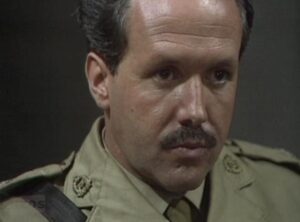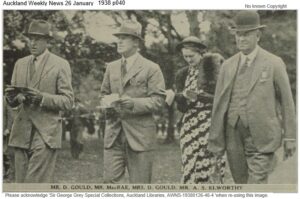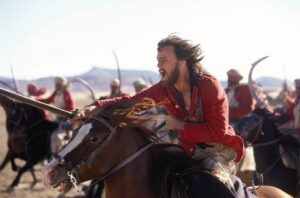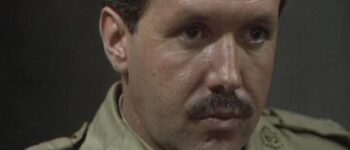1942: Coming and Going
August 23, 2021
By AHNZ
 New Zealand’s World War 2 record by mid-1942 wasn’t anything to crow about. We had declared war on things, sent men on long boat rides, and helped Stalin steal a sailing ship.
New Zealand’s World War 2 record by mid-1942 wasn’t anything to crow about. We had declared war on things, sent men on long boat rides, and helped Stalin steal a sailing ship.
Our efforts in the Mediterranean had so far been a bitter reminder of the abject failure and death of Gallipoli in the first war. First, we were kicked out of Greece. Then we were kicked out of Crete. Then we were encircled by German panzer tanks at coastal Egypt. Surely the moral of the story is not to use New Zealanders in Mediterranean warfare.
Only at this point did our warriors snap out of their menial position and begin to emulate Captain Charles Upham by behaving as an Honour Culture and becoming winners. On 27 June, 1942, we powered out of the German trap and started holding our own in combat and then chased General Rommel down.
Lt. Dan Davin, the writer, was one of the men caught up in all of these fortunes. At the New Zealand Division’s HQ, Maadi Camp, he recovered from wounds inflicted at Crete. This is the setting for one of Davin’s short stories, Coming and Going. Although it’s not a true story it does give us a reliable picture of a New Zealand soldier’s state of mind at that time by one of their own who was there to experience it and write it down. The story was also made into an excellent short film in 1982. Ref. NZ on Screen
Major Cliff Reading
Andy is the protagonist of the story, an officer just like the author. Andy, like Dan Davin, has recently recovered from war wounds and been out of the loop. He comes to Maadi Camp unaware that his old associate, Major Cliff Reading, has become persona non grata in his absence. The story is the tale of Andy slowly, painfully, ‘reading the room’ to recognise that Reading has been socially ostracised from his fellow soldiers. And, finding out what he had done to deserve this.
Reeding, played by David McPhail (died May 2021) in the film, was never that popular in the first place. A Christchurch man, he was already suspect of being snooty. One of the airs and graces men like this used to put on to distance themselves above the rank and file was to put on an English accent. Or, at least what a Middle Class Christchurch man estimated an English accent to be. That was a pretense that the war had burst because our soldiers had now had enough contact with real Englishmen to recognise it had been fakery all along: “..and his accent seemed to have gone a bit pommier than usual, or what he though was pommy, only that was another thing that meeting a lot of pommies had made some of us wise to.”
 At home, before the War, Reeding had worked as a stock agent or some other fairly cushy and important job that puffed up his pride. He used to talk about what a big shot he was but he’s quiet now. He used to rub shoulders with the members of the big sheep station families, the aristocracy of Canterbury. If he wasn’t socialising with the ‘Squattocracy’, Reading was strutting his stuff in the Territorials.
At home, before the War, Reeding had worked as a stock agent or some other fairly cushy and important job that puffed up his pride. He used to talk about what a big shot he was but he’s quiet now. He used to rub shoulders with the members of the big sheep station families, the aristocracy of Canterbury. If he wasn’t socialising with the ‘Squattocracy’, Reading was strutting his stuff in the Territorials.
All of these characteristics rubbed men like Andy up the wrong way. While they had been enduring the depression and holding the ethic of ‘Jack is as good as his master’ equality, people like Reading put themselves above. Reading had the excess calories to be a weekend warrior in the Territorials while others didn’t. Reading’s role in the Territorials fast-tracked him into high position in the New Zealand Division too. All of these things were reasons to resent men like Reeding yet, as Andy says, the men put that behind them and got on with the war. They were all in it together now.
The Unforgiven
What did Reading to to be socially ostracised? It differs between the book and the film but ends up the same way. In the text, Reading is an out-and-out coward who fled the scene of battle and the men he commanded. Nobody could quite prove it but everyone knew it and so did Reading, despite all his hand-wringing attempts to excuse it to himself or to the last man who would listen: Andy.
The film doesn’t let the viewer off so easy about judging Reading. In this situation it’s a clear case that Reading’s Company is going to be wiped out by the enemy. Certain death for them that Reading could foresee. The writing was on the wall. Only one choice to make: Does he go down fighting or does he abandon a lost cause? David McPhail, a Christchurch man with a very convincing English-Kiwi diction, is well cast as the conflicted Reading. Why should he die too? Hadn’t he better live to fight another day? Survive to avenge his men? To report on what happened like Aristodemus at Thermopylae?
The Honour Culture answer to that question is: No. You don’t go. You die fighting beside your people. New Zealanders might have been r-selected when they entered this war but that had changed now. This was nowhere more clear than in the trend for our soldiers to stop retreating and abandoning and being taken prisoner and losing but to stand their ground as they now had done at Egypt. A K-selected culture doesn’t leave men behind. Our mainstream had accepted that at this point but Reading had been left behind in the transition.
“Still, I thought, I suppose even old Reading feels it a bit, clearing out and leaving the boys to it like this. It’d be better to be going home when everyone else did, with the feeling that you’d taken your chance right up to the last like the rest of them.” – Coming and Going
“It might seem strange that a man just married, and very much in love with his wife, and who had been waiting so long to be together with her, would still feel that he had to go away to fight again. Only those who have lived through such times can understand the conflicting emotions which so many felt when confronted with such hard decisions. As for myself, I, who had then done so little, could not have held my head up and looked my battle-weary friends in the eye, if I had not voluntarily gone out again to the battle front.” – p75 John Marshall Memoirs (1983)
“The K will change the world because it wont change him, preferring death before dishonor, to die on his feet rather than life on his knees.” – The r/K Selection Model
So it was, like a proverbial Roman falling on his sword, that Major Reading shot himself dead. He couldn’t stay to lead or fight. The men wouldn’t have him. He couldn’t go home either, this stigma would follow him anywhere. His reputation and dignity were bankrupt beyond repair.
It’s not a true story in the sense that this was a real New Zealand soldier and these events happened the way it was written. But it is an aesthetically true story. Lots of New Zealand soldiers faced the Reading Dilemma and, I’m sure, it was the cause of many suicides too. What else could Reading do but be the “going” part of the story title? And who would know or care if it were not for Andy being the “coming” part who was out of the loop and had to intellectually process what others had done by instinct?
No Expiation
 For a disgraced man in the New Zealand World War 2 K-culture (Upham Honour Culture, AHNZ calls it) there was no way forward. You get shunned and you die. This solution lacks sophistication and wastes lives, of course. Other cultures have a higher level of K social technology that New Zealand, like the Ancient Romans, apparently lacked. Nobody offered Reading a ritual he could have gone through to purge himself of his shame. No quest, no mission impossible, no forlorn hope, was on the table that would have allowed honor to be recovered. Nobody had thought to incorporate Alfred Mason’s answer given in The Four Feathers (1902) of another British coward in an earlier Egyptian war.
For a disgraced man in the New Zealand World War 2 K-culture (Upham Honour Culture, AHNZ calls it) there was no way forward. You get shunned and you die. This solution lacks sophistication and wastes lives, of course. Other cultures have a higher level of K social technology that New Zealand, like the Ancient Romans, apparently lacked. Nobody offered Reading a ritual he could have gone through to purge himself of his shame. No quest, no mission impossible, no forlorn hope, was on the table that would have allowed honor to be recovered. Nobody had thought to incorporate Alfred Mason’s answer given in The Four Feathers (1902) of another British coward in an earlier Egyptian war.
Harry Feversham, in that novel, was a similarly disgraced officer to Cliff Reading. What came of this disgrace was not a painful alcoholic spiraling down culminating in a suicide bullet. Instead, an heroic action story plays out which has inspired 7 feature films so far. Feversham was most recently played by Heath Ledger in the 2002 version and no doubt will be again in the mid-2020s as this story is re-told an eighth time for the new Honour Culture era.
This un-creative melancholic fatalism is all too typical of the New Zealander. Wander outside the reservation and you will be clobbered by Gordon McLauchlan’s ‘Passionless People’ for being a too-tall or too-short of a Poppy. We are still too conformist as a society for any of us to contemplate a passionate hero’s journey of redemption for ourselves or others. Thus, a perfectly good set up for a smash action film is instead a short story ending with our beloved David McPhail killing himself off camera.
—
Ref. also 1972: The Scatter Hypothesis, AHNZ
Ref. Selected Stories, Dan Davin (1981)
Image ref. Mr and Mrs D. Gould of Pyne Gould Guinness fame and others socialising in 1938; George Grey Special Collections, Auckland Libraries
Ref. Loose Enz – Coming and Going (1982); NZ on Screen
 Like Comment Share
Like Comment Share





